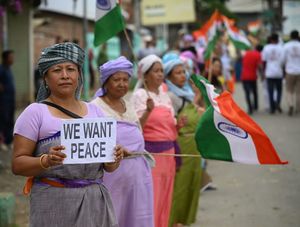Accountability or being responsible for one’s actions, of being answerable, are basic tenets, not just of a democracy, but any civilised society. In the absence of accountability, chaos, anarchy and injustice will follow. And those in positions of power may misuse their authority in any way they please.
Some days ago an absolutely chilling video of two women being paraded naked and molested by a mob went viral on the internet. The incident took place on May 4 in Manipur, which has been on the boil for some months—Meitei versus Kuki tensions that were simmering for long erupted after a High Court order in April that granted tribal status to the Meitei community.
Fresh protests by the Kukis began in Manipur and soon turned violent with clashes with the police and the local administration. The BJP government of N. Biren Singh responded with a crackdown, curfews and internet shutdowns. The violence, however, has not stopped entirely. Existing fault-lines and tensions between the largely Hindu Meiteis and the predominantly Christian Kukis have deepened and taken on a communal tinge, and violence, rioting and rape have followed. The violence in Manipur and attacks on civilians and churches have prompted the European Union to adopt a resolution, and the British parliament raised the issue in the House of Commons, while the US ambassador to India offered ‘assistance’ to help solve the conflict. But the prime minister has been busy with world trips, and large defence purchases that sit pretty with international laurels. After months of studied silence, a gruesome gang-rape and the naked march of women survivors prompted the prime minister to make a measly statement that found a way to blame the opposition for rapes in their states!
One would assume that any responsible central leadership would understand that the humanitarian crisis in Manipur is grave and the conflicts damaging from a strategic perspective and impose presidential rule and/or initiate peace talks with the stakeholders. Instead, our government has suspended opposition MPs like Sanjay Singh for demanding Narendra Modi’s presence in the house when Parliament debates Manipur. Biren Singh has refused to resign and callously said that hundreds of such cases (raped women being paraded naked by mobs) have taken place in Manipur and thus the internet shutdown. Right-wing media and social media have attempted to equate the trauma of the women survivors with previous gang-rape cases in Chhattisgarh, Rajasthan or West Bengal. Meanwhile, panic has gripped Meiteis in neighbouring Mizoram, too, with rumours that similar conflict will start there, too.
Who then should be accountable? Why do citizens vote if not to look to the government to maintain rule of law even in times of conflict? Isn’t the basic duty of an elected government, especially a ‘double engine’ government (led by the same party—BJP in the state and the Centre), to safeguard the lives and livelihood of its people and de-escalate conflict?
As I type these last few lines out at a Mumbai cafe, a familiar face appears at the table; an acquaintance from the film fraternity. He orders himself a latte and begins to chat. He talks of how he’s beginning to work more overseas and is soon going to shift his family abroad because there are no ‘guarantees’ anymore in India. “You never know who will enter your house, or if a mob will attack you. I mean look at Manipur! It’s too bad you know! Can’t live in India anymore. I voted for Modi in 2014, but I never thought it would come to this.”
I nod silently. That is what the people of Manipur must be saying, too.
The writer is an award-winning Bollywood actor and sometime writer and social commentator.


